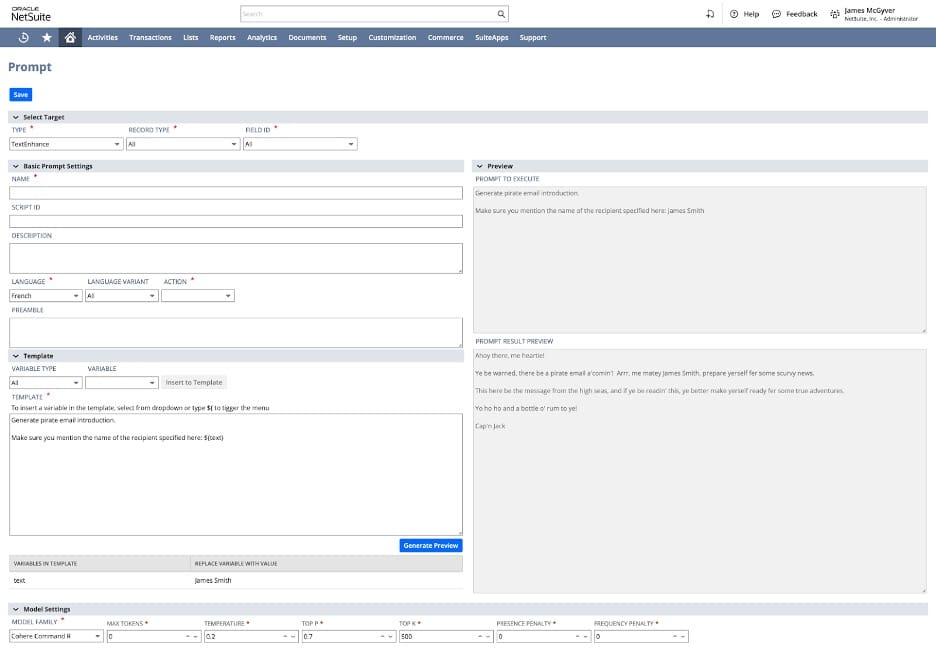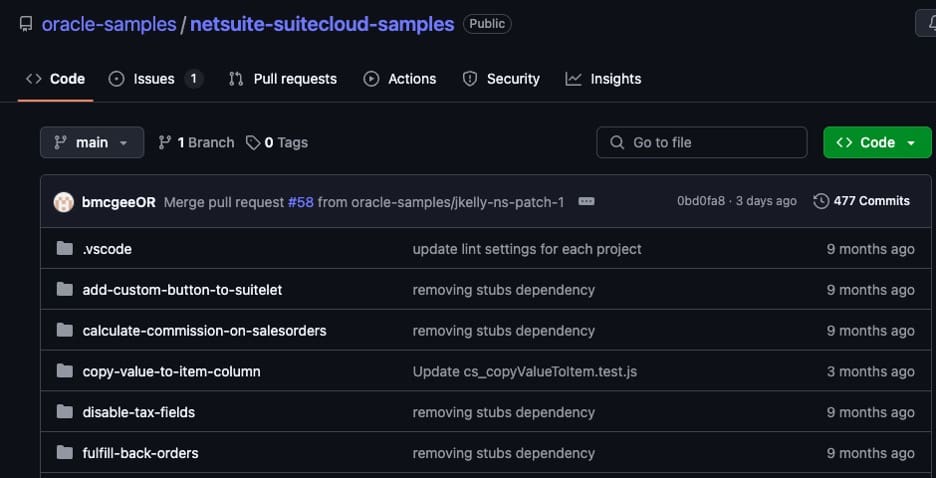SuiteCloud Platform offers powerful tools and technologies that let developers and technical administrators customize, integrate, extend, and manage their businesses’ NetSuite environments.
With NetSuite 2025 Release 1, SuiteCloud Platform has added a new wave of features for building applications and integrated product functionality based on generative AI services. We’re also adding a range of new capabilities including hardened security with OAuth 2.0, specialized roles for more cost-effective access, and an expanded SuiteScript 2.1 code sample library for software developers. The new developer capabilities show NetSuite’s commitment to dramatically enhance native product functionality and create a more efficient user experience across the entire Suite. The AI features built off the new AI-powered features announced at SuiteWorld 2024.
Developer highlights in NetSuite 2025 Release 1
SuiteScript Generative AI API: With this release, SuiteCloud developers can access large language models (LLMs) powered by Oracle Cloud Infrastructure (OCI) Generative AI services, using an API in SuiteScript version 2.1.
The module, called SuiteScript n/llm, lets developers integrate generative AI models into NetSuite customizations and SuiteApps. SuiteScript developers can use these models to generate reports, summarize data, manipulate text, and perform natural language processing (NLP) queries. A rich set of use cases that include automated documentation, chatbot integration, predictive analytics, and anomaly detection are now within reach to any NetSuite customer or partner.
NetSuite Prompt Studio: Prompt Studio extends NetSuite Text Enhance to make it easier to create and format text-based content throughout the Suite. Developers can use Prompt Studio to define custom AI-powered actions to generate and craft a wide range of content types including reports, email templates, tables, web pages, quotes and more. Prompt Studio also provides an ability to generate externally facing documents with a highly polished and consistently branded appearance.

Enhanced SuiteCloud SDK security with OAuth 2.0: To help minimize the risk of unauthorized access to business-critical data, all SuiteCloud software development tools that rely on the SuiteCloud SDK to connect with NetSuite services now fully support OAuth 2.0 authentication protocols. These tools include SuiteCloud IDE extensions for VSCode and WebStorm, and the SuiteCloud CLI for Java and Node.js, all of which are part of the SuiteCloud Development Framework.
Two options are available based on preferred access method:
- User sessions initiated from a web browser can now authenticate to target accounts using credentials associated with existing NetSuite account-roles (browser-based authentication).
- In Continuous Integration (CI) scenarios that don’t require direct user interaction, accounts can be configured with RSA certificates in conjunction with account-role combinations to authenticate (machine-to-machine authentication).
Please note that starting in February 2025, Token-Based Authentication (TBA) and OAuth 1.0 functionality previously supported by SuiteCloud SDK version 2024 Release 1 will no longer be available for new installations. Any customers or partners still using older SDK versions are encouraged to upgrade to the latest version as soon as possible. More information about OAuth 1.0 deprecation is available here (opens in new tab).
SuiteCloud SDK secure credentials storage: In addition to SuiteCloud SDK support for OAuth 2.0 based authentication, NetSuite is adding an additional layer of security to password-protected credentials for authenticated SDK users.
When authorized users first log in, the SDK auto-generates and stores an encrypted token containing login information to a local secure location, such as MacOS Keychain, setting the stage for a streamlined and transparent login experience for future sessions. Note that this mechanism supports both browser-based and machine-to-machine authentication as noted above.
Specialized user roles: SuiteCloud added two specialized user roles that make it easier and lower cost to administer user types that only require limited access to specific product functions. Because these roles are restricted, the license cost per user is considerably less as compared to full user licenses.
The CRM Role includes predefined permissions for CRM-specific activities restricted to sales, CPQ, marketing, support, and related CRM tasks. A full list of available permissions is available here (opens in new tab). The View and Approve Role contains permissions that permit access to basic tasks such as view/approve reports but restrict the ability to view sensitive information, for example payroll and employee records. A full list of permissions is available here (opens in new tab).
Both roles can be customized to provide more stringent, finer-grained access control to NetSuite functionality as needed for individual customer accounts.
New SuiteScript code samples: Source code documentation in the form of snippets, samples, and even full applications can serve as an invaluable resource for software developers to see how to best implement new or extended product capabilities.
NetSuite has a long history of providing a comprehensive library of SuiteScript code examples and technical content for developers in Help Center, SuiteAnswers, and more recently in public GitHub repositories. To best serve the NetSuite developer community and provide access to the most current examples of technology such as SuiteScript version 2.1, these libraries have been populated with new samples, and we will continue to add more with each new release.

Samples in 2025 Release 1 cover the Generative AI API (n/llm) module, Single Page Applications (SPAs), and several source code examples that were shared at developer track breakout sessions during SuiteWorld 25 in Las Vegas. Check out the SuiteScript Code Samples repository on GitHub to learn more (opens in new tab).
Learn more about all the updates in NetSuite 2025.1
These are highlights of just some of the game-changing features in NetSuite 2025 Release 1. Read more about what is in the release on our Sneak Peek page or dive deep into the release notes (opens in new tab). Most importantly, don't forget to request your Release Preview test account (opens in new tab) so you can get hands-on access and see how new features will work with your data, workflows, and customizations.
The preceding is intended to outline our general product direction. It is intended for information purposes only, and may not be incorporated into any contract. It is not a commitment to deliver any material, code, or functionality, and should not be relied upon in making purchasing decisions. The development, release, timing, and pricing of any features or functionality described for Oracle’s products may change and remains at the sole discretion of Oracle Corporation.








